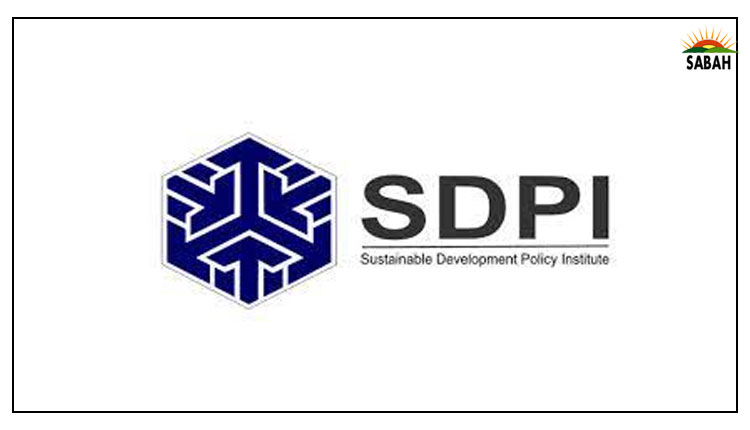Speakers call for pragmatic & revolutionary framework to achieve economic, digital transformation
ISLAMABAD, Jan 23 (SABAH): Speakers at a one-day roundtable on Tuesday stressed the needs for a pragmatic and revolutionary policy implementation framework in terms of taxation and revenue generation to achieve economic and digital transformation to make country resilient and sustainable.
The roundtable titled, “Reshaping the Discourse: The Way Forward for New Government: Economy, Energy, and Digital Transformation,” was organized by Sustainable Development Policy Institute (SDPI) here on Tuesday.
In his opening remarks, Dr. Abid Qaiyum Suleri, SDPI Executive Director, said this session seeks to come up with a practical and pragmatic approach for the upcoming government and will focus on how the government can make policies to address issues like tax exemption, subsidy cushion, filling tax losses for economic recovery, and policy and implementation reforms.
Dr. Khaqan Najeeb, Senior Public Policy Advisor and former Aide to the Finance Ministry, said the policy designs should be given more space to the private sector. However, he said, it is crucial to maintain micro and macro-economic stability while making the next IMF program.
Amid all this there are some subjects that might be shifted from Centre to provinces, Dr. Najeeb said, suggested interventions around debt restructuring (or reprofiling) of Pakistan along with a need for PSDP reforms (Medium-term agenda for IMF) and analyze the tax expenditure to resonate with the fund.
While commenting on Pakistan’s economic challenges, he said for the IMF programmes completion, it is necessary to evaluate past challenges, and strategize it to ensure its successful implementation. However, he said, the next government, should focus on restructuring the recurring budget to alleviate strain on the economy and prioritize efficiency and sustainability.
To address Debt Repayments issue, he further said with a staggering debt in billions, the government would have to explore debt restructuring options and negotiate with IMF on terms that are manageable and sustainable for economic recovery.
Najy Benhassine, The World Bank Country Director, Pakistan, said: “Economic turnaround requires time and policy continuity is the key to progress. The next government must commit to consistent policies, fostering long-term development,” he said.
Dr. Sebastian Paust, Head of Development Cooperation, Germany stressed the need to rationalize social protection expenditures and synchronize inter-provincial taxation for stable and realistic policy measures. The new government needs to go into more transparent and realistic negotiations with IMF, he added.
Dr. Paust was of the view that learning from Germany and France, Pakistan’s next government should explore regional opportunities as fostering regional peace and stability are the keys to sustained progress.
Umer Bhatti from All Pakistan Textile Mills Association underlined the need to diversify export-oriented products and move away from the traditional products and traditional export market. The next government must prioritize balancing act in revenue generation especially by reducing burden of import tariff, reliance on import tariffs from trade policy, and rationalize tariffs for competitiveness besides re-evaluating import substitution for true diversification, he added.
Sumera Abbassi, TiE Executive Director, said: “Startups drive economic growth, but Pakistan faces challenges with an unfavourable regulatory environment. The next government must prioritize a conducive ecosystem to boost foreign investors’ confidence in the high-potential startup landscape.”
The second session of the roundtable titled: “Digital Transformation Reforms Agenda and priorities for Pakistan post-2024 Election”, was moderated by SDPI Joint Executive Director, Dr. Vaqar Ahmed.
Initiating the discussion, Khurram Rahat, the Vice-Chairman of P@SHA, said continuity of every endeavour is a major issue in the country’s system whereas
Pakistan’s Information Technology or IT sector bears great potential to rise and grow. He recommended that the new government needs to ensure a robust framework for digital transformation and digital cyber security along with strict implementation of legal frameworks and open data policy to stir monetization of data with increased public access.
Rehan Akhtar, the Chief Executive Officer of Digital Miles, said the process of transformation could not be a short-term agenda and it is high time to embrace a long-term vision for a sectoral change with IT industry being visualized as export industry that has the potential to transform the local industry that lags behind digital transformation.
He recommended that the small and medium enterprises needs to be digitalized, as it must shift its counting and bills from paper and pen. The government for innovation would have to create sandboxes as there has been less experimentation to welcome new ideas and solutions.
Shanul Haq, the Head of Regulatory Affairs, Telenor said the data layer was very weak and complacent in the telecommunication sector of the country. He added that the prevailing infrastructure was incompatible to meet the needs of 5G technologies. However, there is a huge discrepancy in terms of spectrum operations, which was available in the country, but it is being underutilized by the sector, he added.
Mr Haq recommended for better sector specific taxation needs to be made prudent, with tax anomalies in terms of mandatory taxes on every telecommunication users and online monetary solutions like easypaisa as every individual regardless of its financial status was paying an advance 12.5% tax.
Faisal Suhail Butt, Private Sector Specialist at Pakistan Single Window, said: “Private sector collaboration is the key to public sector digitalization. A domestic policy on data protection is crucial, and efforts should focus on bridging the digital divide between federal and provincial governments and amongst different population groups.”
Osman Nasir, the Founder of Aletheia Teqi, said the next government agenda should revolve around digital inclusion for secondary and tertiary cities, empower youths to capture local opportunities, reduce migration and stimulate dollar income in these cities for transformative impact.












